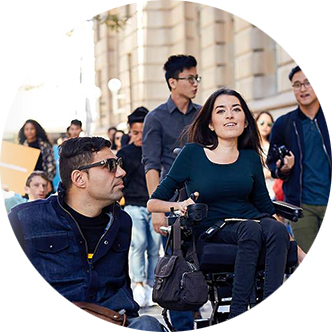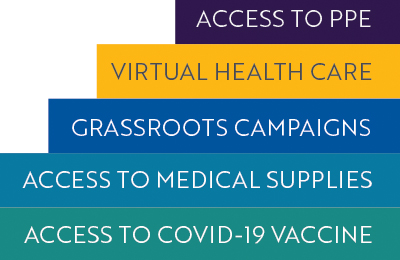This is a critical time for advocacy at Spinal Cord Injury Ontario. The past year has brought unprecedented challenges, from working remotely to meeting rising demands with falling revenue. Yet the organization hasn’t skipped a beat in speaking up for – and with – its community members and addressing gaps in crucial support and services for Ontarians living with disabilities.
“The voice of people with spinal cord injuries needs to be stronger than ever right now,” says Peter Athanasopoulos, Director of Public Policy. “Despite the obstacles, we’re building on our strong roots of advocacy while finding new and innovative ways to be heard.”
A long history of advocacy
SCIO was founded by a group of individuals who were among the first to speak out on behalf of people with spinal cord injuries. It’s part of a network of independent SCI organizations across Canada that grew out of the Canadian Paraplegic Association, created in 1945 by a group of Second World War veterans with spinal cord injury.
At a time when it was the norm for people with disabilities to live out their lives in hospitals or institutions, these founders envisioned a different, better existence for themselves and their peers. They worked tirelessly to secure government and community support for improved services and assistive devices.

“At SCIO, all of our advocacy comes down to ensuring that people with spinal cord injuries are heard whenever decisions are made about their lives and the issues that are important to them.”
– Peter Athanasopoulos, Director of Public Policy
Over the decades, SCIO actively engaged in initiatives that led to advances in employment, housing, attendant services and other resources for people with spinal cord injuries. Whether it’s a largely invisible victory such as securing access to essential medical supplies or a highly publicized accomplishment such as garnering support for the passing of Bill C-81, An Act to Ensure a Barrier-Free Canada, the organization has a long track record of campaigning for the rights of individuals with disabilities.
Advocacy & public policy
Today, SCIO operates in the world of public policy advocacy. Public policy is simply what governments and public officials decide to do – or not do – about specific problems and issues. It includes all the laws and rules that can either help or hurt people and causes. Public policy advocacy is the broad array of activities that aim to influence decision-makers and the policies they create.
“At SCIO, all of our advocacy comes down to ensuring that people with spinal cord injuries are heard whenever decisions are made about their lives and the issues that are important to them,” says Athanasopoulos. “Whatever strategy we and our partners use, our goal is to create sustainable and enduring positive change that enables fair and equitable services for people with disabilities
Taking it to the next level
SCIO’s advocacy efforts have evolved over the years as the organization grew and its operations became more sophisticated. Recognizing the desire from our community to mobilize more effectively, SCIO established a formal public policy program about six years ago. “Since then, our focus is on advocacy at a system-wide level,” says Athanasopoulos. “Amplifying our community’s voice is one of the three primary objectives in our strategic plan.
SCIO takes a non-partisan approach to advocacy that includes traditional tactics like writing letters to government officials, but also more modern methods such as grassroots campaigns, building relationships with decision-makers, developing community leaders and heightening awareness on social media.
“The rise of social media and increasing transparency in news coverage of our elected officials have sparked more grassroots advocacy, which relies on strength in numbers,” says Athanasopoulos. “It’s a different way of getting to the same result, where people with spinal cord injuries come together and put their views forward instead of the organization speaking for them.”
 The pandemic’s dual effects
The pandemic’s dual effects
The pandemic exposed profound instability in the programs that enable health and well-being in people with spinal cord injuries. “The weaknesses in the system that we’ve seen this past year had the potential to introduce tremendous precarity into their lives,” says Athanasopoulos.
At the same time, the crisis revealed the unwavering commitment of the SCIO community to ensuring the needs of people with disabilities are acknowledged and met. “If it wasn’t for the involvement of SCIO and our partners during the pandemic, we would have seen more hardship,” he says.
With the global supply chain disrupted, the organization leveraged its government and community connections to alleviate the increased costs of vital Personal Protective Equipment and medical supplies. More recently, SCIO played a leading role in the vaccine rollout plan for people with disabilities.
“This was a year of addressing the immediate holes in the system exacerbated by COVID-19 to keep people with spinal cord injuries safe and healthy,” says Athanasopoulos. “It wasn’t a year when there was much time or resources for advancing transformational change.”
Even so, community members found ways to push forward on grassroots campaigns such as banning rental e-scooters on sidewalks, improving the accessible parking permit program, and finalizing a report on public coverage of intermittent catheters and related supplies. “The pandemic and its obstacles didn’t weaken their dedication to stepping up in support of their peers,” he says.
It’s a two-way street
Athanasopoulos describes his role as managing traffic on a two-way street. On one side, there are the SCIO community members, who have many – often urgent – concerns and needs. On the other, there are public policy-makers, who must balance the requests of countless individuals and groups while remaining within budget.
“The most important thing that we do is keep our community up-to-date on government actions that affect people with disabilities,” he says. “Once they’re armed with that information, they can share their ideas and opinions with the government. Creating that conversation is incredibly impactful.”
Over the years, SCIO has earned the respect of decision-makers, which is critical to productive dialogue and effective advocacy. “We take our responsibility to be honest brokers very seriously,” says Athanasopoulos. “We never ask the government to simply throw money at problems. We deliver evidence-based recommendations that are workable given budgetary constraints.”
The evidence for these recommendations comes from the Ontario SCI Alliance, co-led by SCIO and – until recently – the Ontario Neurotrauma Foundation (ONF). The alliance is made up of 250 researchers, clinicians, service providers and people with lived experience of spinal cord injury. “Our ability to explore best practice in a rigorous way and generate data-driven recommendations sets us apart from other disability organizations,” he says.
“If we don’t come together to educate decision-makers on the lived experience of people with spinal cord injuries, then people won’t get adequate services. They’ll lose their independence, their social participation will weaken, they’ll struggle to maintain employment and they’ll become second-class citizens. Advocacy comes down to saving lives. That’s what wakes me up in the morning.”
– Peter Athanasopoulos, Director of Public Policy
That capacity is under threat, however, because of the closure of the ONF this spring. SCIO is now facing a $200,000 funding shortfall for the work of the Alliance. “This is a major blow, as we depended on the alliance to deliver robust solutions based on the latest research that in turn is organized to influence knowledge translation with decision makers,” says Athanasopoulos.
Easier and more accessible advocacy
SCIO has always relied on the community’s collective voice to achieve policy changes. “Bringing forward people’s lived experience is essential if we want to see both short- and long-term improvements in programs and services,” says Athanasopoulos. “When a large pool of people is willing to work together toward a common cause, the results are extraordinary.”
To ease the way for those who may be interested in getting involved, SCIO created a new public policy platform on its website this year. “Joining the conversation is simple now,” he says. “Anybody can communicate with a Member of Provincial Parliament in less than two minutes.
Since the platform launched, community members have developed campaigns on diverse systemic barriers that affect their quality of life. Community leaders establish the campaigns and SCIO staff support them. “We’re building teams and mobilizing community members to provide evidence-based recommendations,” says Athanasopoulos.
Now is the time to speak up
With funding for neurotrauma research in jeopardy and community members’ needs only increasing, SCIO is redoubling its efforts to maintain a dialogue with decision-makers. While community partners rose to the challenge of meeting emergency needs during the pandemic, the most pressing issues for people living with spinal cord injuries remain the same: greater access to mobility devices and medical supplies, more inclusive access to health care and a stronger commitment to realizing the Accessibility for Ontarians with a Disability Act’s goal of a fully accessible province by 2025.
The stakes for advocacy are always high, says Athanasopoulos, but in today’s uncertain landscape of pandemic recovery and government debt they are even higher. “If we don’t come together to educate decision-makers on the lived experience of people with spinal cord injuries, then people won’t get adequate services. They’ll lose their independence, their social participation will weaken, they’ll struggle to maintain employment and they’ll become second-class citizens. Advocacy comes down to saving lives. That’s what wakes me up in the morning.”






